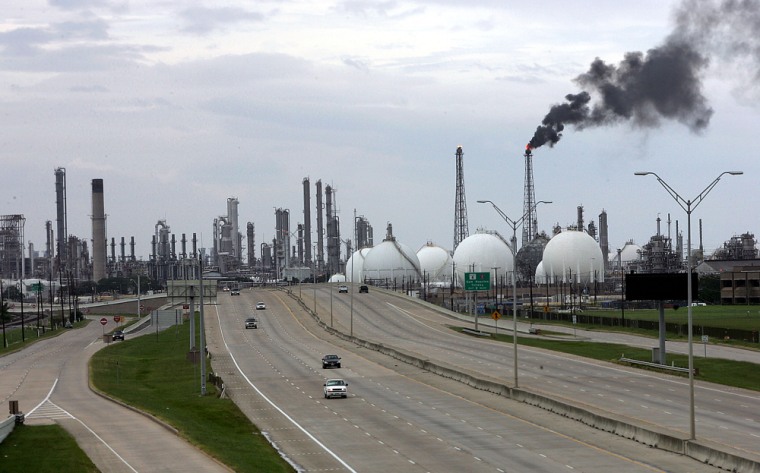Faced with the threat of a knockout blow from Hurricane Rita just days ago, the U.S. energy industry heaved a collective sigh of relief Sunday as initial assessments show only limited damage to oil and natural gas platforms in the Gulf of Mexico and the huge refining complexes clustered along the coast.
"We've been doing surveillance of the refineries; so far what we see is minimal damage and we hope that holds," David Paulison, acting director of the Federal Emergency Management Agency, said Sunday. "But we'll continue monitoring that to make sure that we can get those refineries back on line as quickly as possible."
That means energy consumers -- from motorists to airlines -- have apparently dodged the bullet of another sharp spike in prices.
“In the next several days you’ll probably see pump prices rise, reflecting the hiccup in the system we have to go through,” said John Kilduff, an energy analyst at FIMAT USA. “But it should be much lighter than we saw with Katrina.”
Price pressures in the energy markets are also expected to ease thanks to a short-term drop in demand. Despite temporary surges in demand from back-to-back storm evacuations, overall demand is tracking about 3 percent lower than this time last year, according to the latest figures form the U.S. Energy Information Administration. With hundreds of thousands displaced by Katrina and now Rita, normal driving patterns have been interrupted.
Refinery outages have also eased the demand for crude oil, prompting a pullback in prices. In a special NYMEX electronic trading session Sunday, U.S. crude oil futures were down over $1 to around $63 a barrel.
A shift in the path of the storm, which weakened as it made landfall, spared the heart of the U.S. refining industry from a direct hit. As the storm bore down Friday, 15 refineries had shut down or partially suspended operations. Some of those are already in the process of starting up again.
Others reported only minor damage. ExxonMobil said initial assessment of its half-million-barrel-per-day Baytown, Tex. refinery, the largest in the country, showed that the "damage does not appear to be severe.”
Restarting refineries
After struggling to muster crews after hurricane Katrina scattered Gulf coast energy workers, the industry began preparing the process of restarting operations even before Rita made landfall.
Valero Energy Corp., the largest U.S. refining company, said on Saturday crews had already been sent to its refineries in Houston and Texas City to begin restart efforts.
"Although the convoys have not yet arrived, reports from other individuals in the area indicate that we do have power at these refineries," Valero said.
Valero said it could take two weeks to a month to restart its 250,000 barrel per day Port Arthur, Texas, refinery -- the hardest hit by Rita.
Before it made landfall. the storm had shut down all crude oil production in the Gulf of Mexico along with some 30 percent of U.S. refining. (Four refineries in Louisiana with a combined capacity of nearly 900,00 barrels a day, remain shut from Katrina damage and aren’t expected back online for at least another month.)
As of late Sunday, offshore oil production remained shut down throughout the Gulf and nearly three-quarter of natural gas production was shut in, according to the Minerals Management Service, which manages oil and gas leases of federal lands.
Since Katrina forced the evacuation of offshore drilling rigs last month, some 5.8 percent of annual Gulf oil production -- or about 31.7 million barrels -- has been lost to storm-related shutdowns. The two hurricanes have cut natural gas output by about 4 percent, or 148 billion cubic feet.
But damage to rigs from Rita appeared to be limited, based on initial overflights by the U.S. Coast Guard.
"An aerial assessment of Hurricane Rita's track line was flown in the Continental Shelf region of the Gulf of Mexico. The survey showed two damaged drilling platforms, but no visible sheens," the Coast Guard said in a release late Saturday.
With most oil and natural gas production shut down and refineries closed, many of the pipelines that snake through the region were also shut down. But there was little damage reported to those facilities, which are expected to resume full operations once production begins flowing again.
The storm’s path took it close to a major natural gas facility in southwestern Louisiana known as the Henry Hub, which interconnects with nine interstate and four intrastate pipelines that serve markets in throughout the South, Midwest, Middle Atlantic and Northeast. The facility also serves as a major pricing mechanism for the natural gas futures markets.
Despite initial reports of a leak in the pipeline system, a spokesman for the company that operates the pipeline complex said Sunday those reports were erroneous and no leaks had been found.
